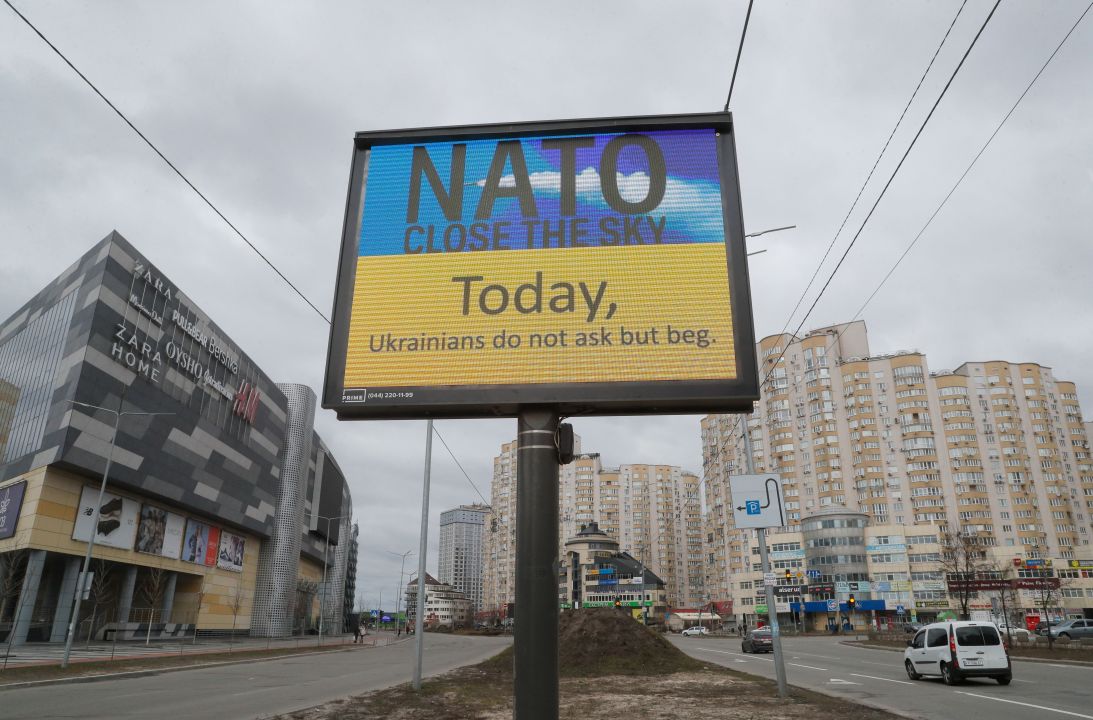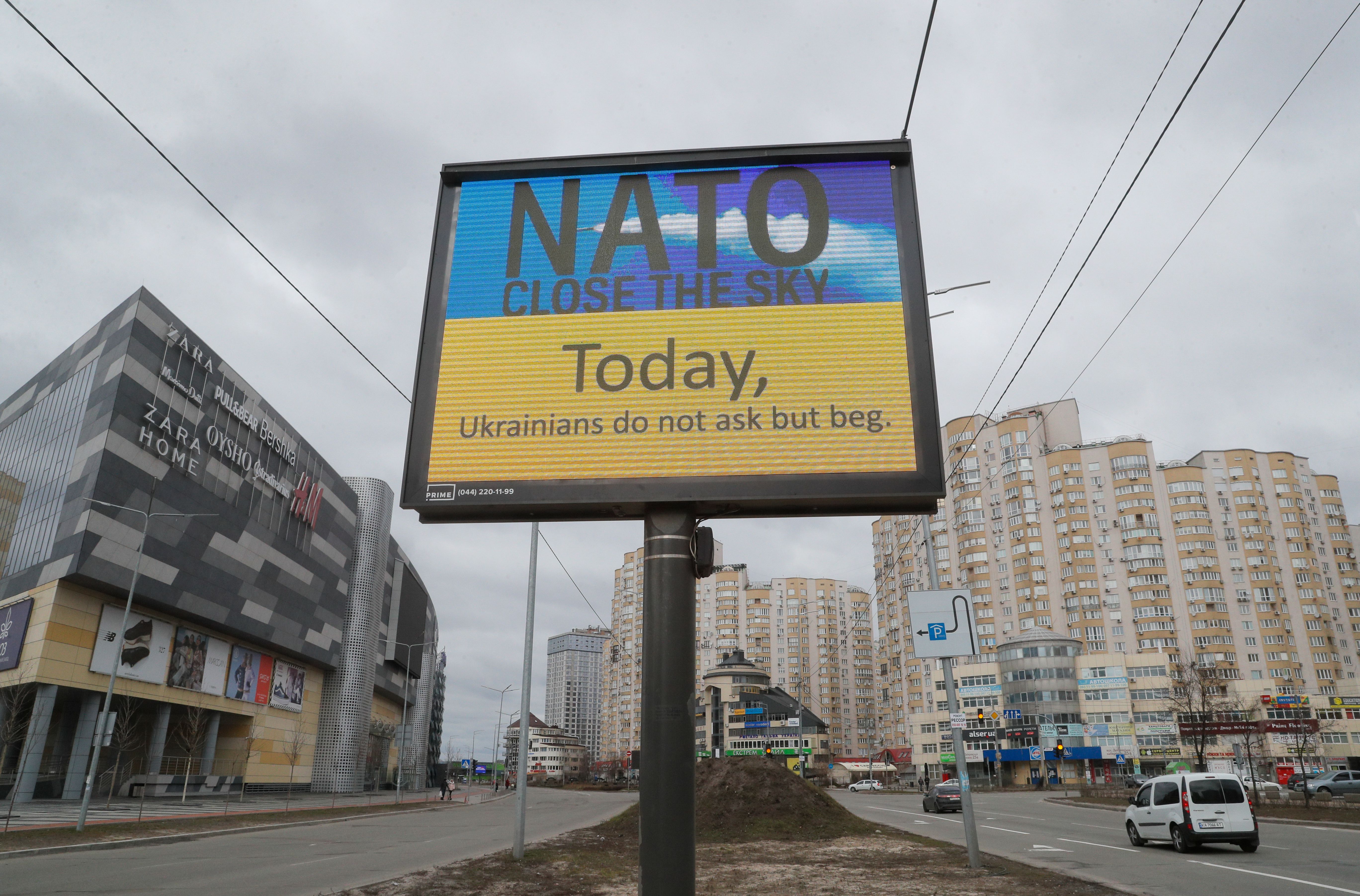Fuelled by repeated appeals from President Zelensky, western support for a no-fly zone in Ukraine is growing. The number of Americans in favour of a no-fly zone outnumber those against by 45 per cent to 20. People seem to feel that something must be done, beyond the sanctions already in place and the provision of weapons. A no-fly zone is something; therefore it must be done.
So far, western leaders have rejected these requests. Nato secretary-general Jens Stoltenberg has explicitly ruled out the idea, as have No. 10 and the White House. On this, if only this, they find themselves in agreement with Vladimir Putin: imposing one would be an act of war.
Despite these warnings, journalists, backbench politicians, analysts, and former Nato commanders continue to call for the implementation of a no-fly zone, damning opposition as an act of appeasement no different to our appeasement of Hitler in 1938, or asking whether our unwillingness to act means we wouldn’t defend Nato members.
As General Sir Richard Barrons points out, there is a chance – if only a small one – that public opinion eventually drags policymakers into actions that put us on a path towards escalation. Some people, used to reading about wars fought against outmatched third-world militaries, seem to believe that we can simply declare a no-fly zone and secure compliance. When told that one would need to be backed by a willingness to engage in combat, support drops significantly. In pursuit of this aim, it’s worth outlining precisely why attempting to implement a no-fly zone could go badly wrong.
The difference between Poland and Ukraine is that we are only credibly committed to defending the former
Say that tomorrow we announce that any Russian jet flying over Ukraine is a legitimate target for Nato forces. How does Vladimir Putin respond to this?
In one world, he rolls over, loses the use of his aerial assets, and continues to shell Ukrainian cities flat through artillery alone. This leads to calls for further intervention to halt the shelling, but more importantly, makes his combat forces less effective than they could be.
Let’s say instead that he keeps them flying. Now the ball is back in Nato’s court. Are we going to follow through with our threat to shoot his air force out of the skies? If we aren’t, we’ve just cost ourselves some of our ability to make credible statements about our future actions and gained nothing. If we do, we’ve just started a war with Russia.
If both sides believe the other is bluffing, there is far too high a risk of accidental escalation. The idea that such a conflict could remain confined to the skies above Kiev is unlikely to hold; airbases and air defence systems on domestic soil would be legitimate targets. The build-up of forces on either border would look more like a threat than a defensive posture, raising the possibility of pre-emptive action.
And at the very bottom of at least one plausible – if not necessarily probable – chain of consequences, we have the potential use of nuclear weapons. Even if you believe that we could reach the stage of direct conflict with Russia without seeing their use, that possibility should make you pause.
Arguments in favour of intervention that wave this risk aside by claiming even Putin would be unwilling to deploy them, or would be prevented from doing so by a palace coup, are bad ones. When we’re discussing the end of the world, we would prefer more certainty than such arguments provide.
People who claim this hands Putin the initiative are almost correct. In sequences of this sort, there is a substantial first-mover advantage. We ceded this in Ukraine when we failed to respond to his initial incursions. The way we fix this is not by escalating in this iteration of the game, but by taking the first step elsewhere.
As public opinion in Finland swings towards Nato membership, and the Finnish President arranges a meeting with the CIA director, Russia makes not-very-veiled threats about the repercussions of such an action. With the roots of the current conflict lying in our failure to sufficiently back Ukraine’s security, we should be willing to commit to the independence and freedom of our northerly neighbours in advance.
Game theorists emphasise the importance of credible commitment – the belief of other players that if you say you’ll do something, you will – and equilibrium, the idea that you choose the best response to your opponent’s strategy, given your beliefs about the world. Threats that you wouldn’t follow through on are empty, and won’t affect other people’s decisions.
People claiming that a failure to intervene in Ukraine makes it likely that Putin will reevaluate our willingness to defend Poland or Estonia are applying a mistaken verdict of this logic. The difference between Poland and Ukraine is that we are only credibly committed to defending the former; there are large conventional forces dedicated to doing so, and an understanding that if Nato fails to meet this commitment then the alliance would crumble, leaving each member on its own.
This is why Nato’s language in response has been extremely specific; it’s a defensive alliance that will ‘protect and defend every inch of Nato territory’. Understanding where the triggers for escalation are is incredibly important in maintaining peace in Europe, particularly given the strategic ambiguity over when each side is willing to escalate to the use of nuclear force. It’s also why it’s important that Nato is able to commit to staying out of conflicts; if we go back on our word now and manage to avoid a nuclear exchange, we’ve opened the possibility that future Russian action will include pre-emptive strikes against our military assets.
That this sort of ‘I think that you think that I think that you think’ is the basis for decisions that could involve half of western Europe turning into a radioactive wasteland may not give you great comfort, but it’s worked surprisingly well to date.








Comments